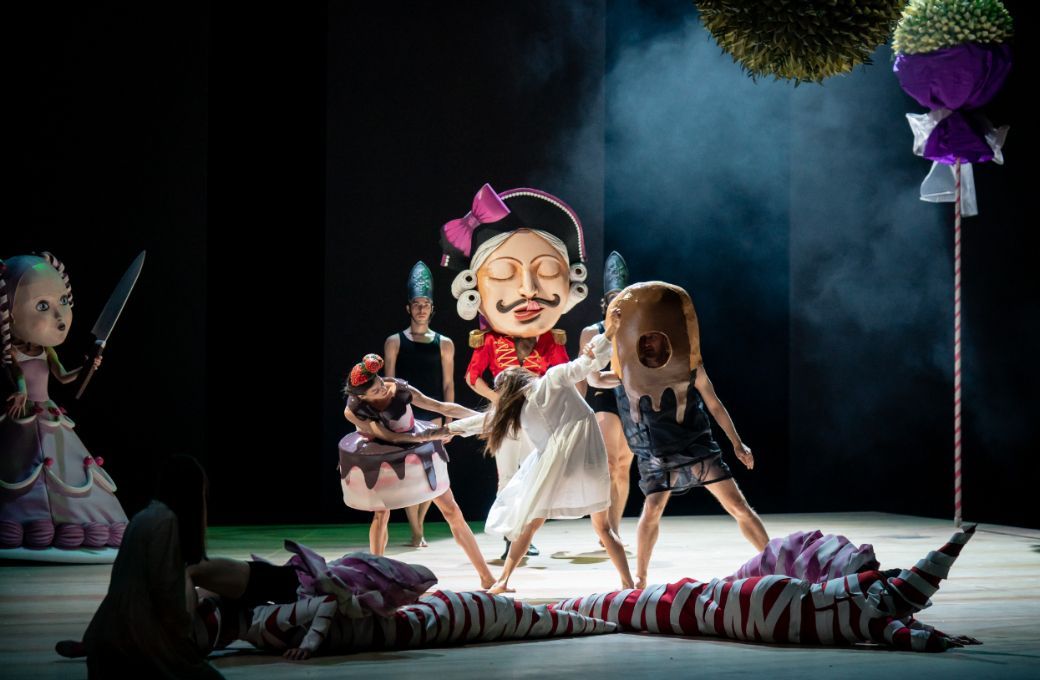When the celesta tinkles its dainty Dance of the Sugar Plum Fairy but the stage action involves a giant cake-doll stabbing herself with a knife while semi-naked lead soldiers accompany a sinister nutcracker lolling its lascivious tongue in pursuit of our heroine, something tells you this is not a festive Nutcracker for kids.

Indeed, it’s not really The Nutcracker at all. Note the title in the Volksoper’s show: Iolanta and the Nutcracker – not Iolanta and The Nutcracker – for what Lotte de Beer and former Music Director Omer Meir Wellber do in their striking 2022 production is not to present Tchaikovsky’s final opera in a double bill with his final ballet, as premiered at the Mariinsky in 1892, but to mash the two together. What results is a 90-minute show, about 80% of Iolanta, in which the blind princess ‘sees’ the world of The Nutcracker in her vivid imagination, choreographed by Andrey Kaydanovskiy and danced by members of the Wiener Staatsballett.
Iolanta is sung by soprano Hedwig Ritter, her double danced by Mila Schmidt and, briefly, by child dancer Ekaterina Gorlatova. Her inner world is initially colourful – pink cupcakes and candy canes – but also decidedly dark. When the Moorish physician Ibn-Hakia – here more of a psychologist – analyses the sleeping Iolanta, her father, the over-protective King René, dons a mouse mask and joins a corps of mice in a sinister Waltz of the Snowflakes in which Schmidt’s Iolanta is manhandled and manipulated. Paging Dr Freud!
But there is joy too. When Iolanta meets Vaudémont, the Burgundian knight who stumbles into René’s court and falls in love with her at first sight, they dance an ecstatic Grand pas de deux to close the first half, accompanied by non-frilly snowflakes in paper tutus. While Mila Schmidt danced with incredible expressivity, well supported by Gabriele Aime as her Nutcracker Prince-Vaudémont double, the corps wasn’t always terribly tidy or disciplined.
Although her lyric soprano is a little small for the role, Ritter sang an effective Iolanta and threw herself into the stage action where she often had to interact with the dancers. Jason Kim was an ardent, occasionally over-stentorian Vaudémont, but it was the lower male voices which stood out the most in this performance. Alexander Fritze’s solid bass made for an authoritative René, contrasting well with Polish baritone Szymon Komasa as Ibn-Hakia. In the small role of Robert – sadly stripped of his brief aria – Trevor Haumschilt-Rocha was a standout, his virile baritone ringing out gloriously. Among the women, Katia Ledoux – the excellent Carmen here in the autumn – impressed in the small role of Martha.
Keren Kagarlitsky conducted a vibrant, sometimes over-loud Volksoper Orchestra – has the tuba ever made its presence so resolutely known in Tchaikovsky's score? – and she paced the music urgently with an eye and an ear to the stage action.
“There comes a time in life when you have to decide whether you want to remain a blind princess or see the world in all its imperfection,” writes de Beer. Her tear-jerking finale is immensely moving. When Iolanta is ‘cured’ and is blinded by light, she cannot relate her inner world to what she sees around her. Why is nobody dancing? She tries to place the singing cast into dance positions but they cannot comprehend. Only when, in the closing bars of the ballet’s apotheosis, she invites her ‘dream dancers’ back onto the stage, is there an uplifting resolution as they teach the cast to dance. The synopsis closes with the sentence “Art makes reality bearable”. Amen.


